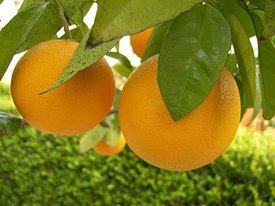EU eyes ban on SA citrus imports
FMCG SUPPLIER NEWS
IOL Business/ Reuters - Nov 19th, 08:37
Johannesburg - The EU is preparing a ban on South African citrus imports that could take orange juice off Europe’s breakfast tables next summer and sour efforts in Brussels to broaden trade with Africa’s biggest economy.
The move follows the interception of 35 citrus shipments this year from Europe’s chief summer supplier that were contaminated with the fungal black spot disease, which growers in southern Europe fear could take hold in their groves.
In response, the European Commission, the EU executive, was drawing up plans for a ban that could be adopted by European governments by the end of this month, said a person with knowledge of the plan who spoke on condition of anonymity.
A person close to the matter said EU trade chief Karel De Gucht had told South African officials during a visit to Johannesburg last week that the contaminated shipments were “serious and problematic”, and a response was needed.
The country exports about 600 000 tons of citrus – mainly oranges, lemons, limes and naartjies – worth e1 billion (R13bn) to the EU each year. It is the main source of orange juice drunk in Britain, Germany and France during the summer months.
The dispute comes at a sensitive time because the EU is seeking South Africa’s support to unlock stalled trade deals with sub-Saharan Africa.
During negotiations last week, EU officials offered to improve the terms of a bilateral free-trade deal dating from 1999 by granting South African sugar farmers duty-free access to Europe for the first time.
For now, the planned citrus ban would be largely symbolic, as it would only apply to this year’s citrus harvest, which ended in October, meaning EU imports have stopped.
The bloc’s food safety watchdog is analysing the situation and if its studies show the disease has a risk of taking hold in Europe’s estimated 500 000ha of citrus groves, the EU could extend the ban.
The head of the SA Citrus Growers’ Association, Justin Chadwick, warned the European Commission against a ban. “Global experts have confirmed that citrus black spot is not a risk, so a ban would seem unnecessary.”
While harmless to humans, citrus black spot causes unsightly lesions on the fruit and leaves of affected plants, reducing quality and quantity. There is no known cure, but fungicides can be used to control the spread of the disease. It is found in many citrus growing regions in the southern hemisphere as well as China and the US, but has never established itself in Europe.
Since 2011, the number of shipments from South Africa found to contain black spot has averaged about 35 each year.
Following calls by citrus growers in top EU producer Spain to take a tougher stance on the issue, the commission said it would be forced take action if more than five contaminated shipments were intercepted from the country this year.
“Every day, South Africa displays its inability to control the pests in its crop,” Spanish farming association AVA-ASAJA said in a statement. “Political interests prevail over the risk that such imports pose to the future of Europe’s citrus farms.”
In its draft scientific opinion published in July, the European Food Safety Authority (Efsa) said the chance of citrus black spot taking in hold in Europe was “moderately likely”. But it added there was a high level of uncertainty because of a lack of knowledge over how the disease would respond to the EU climate.
Efsa is due to finalise its assessment by the end of the year, and its findings will largely determine what further moves, if any, the commission will take to restrict South African imports.
But a group of citrus black spot experts from countries affected by the disease said it had identified “factual errors and omissions” in Efsa’s draft assessment, and that there was no recorded case of the disease ever having spread through fruit exports. - Reuters
© Independent On-line 2013. All rights reserved.
Related News
Liquor producer receives award for corporate support in Ghana
05/12/2013 - 11:04
Indigenous liquor production giant, Kasapreko Company Limited, has been awarded for promoting festivals in Ghana. The company was adjudged the award at this year's National Tourism Awards held at the State Banquet Hall in Accra.
South African economic growth “held back”
04/12/2013 - 08:46
The growth of the South African economy was held back and activity slowed in the third quarter of 2013, the SA Reserve Bank said on Tuesday.
SA yellow maize futures rise to 15-month high
04/12/2013 - 08:15
Johannesburg - South African yellow-corn futures rose to the highest level in more than 15 months in Johannesburg trading.
Namibian farmers back Meatco’s claim for bigger Norway quota
02/12/2013 - 09:30
The Meat Board and unions representing the interest of farmers in the country have backed the country’s biggest meat producer, Meatco, to request that it should get the biggest shares of the 1 600 tonnes export quota to Norway.
SA’s most-used mobile money platforms
02/12/2013 - 09:10
New research finds banking group Absa’s CashSend to be the most popular mobile money system in South Africa.




